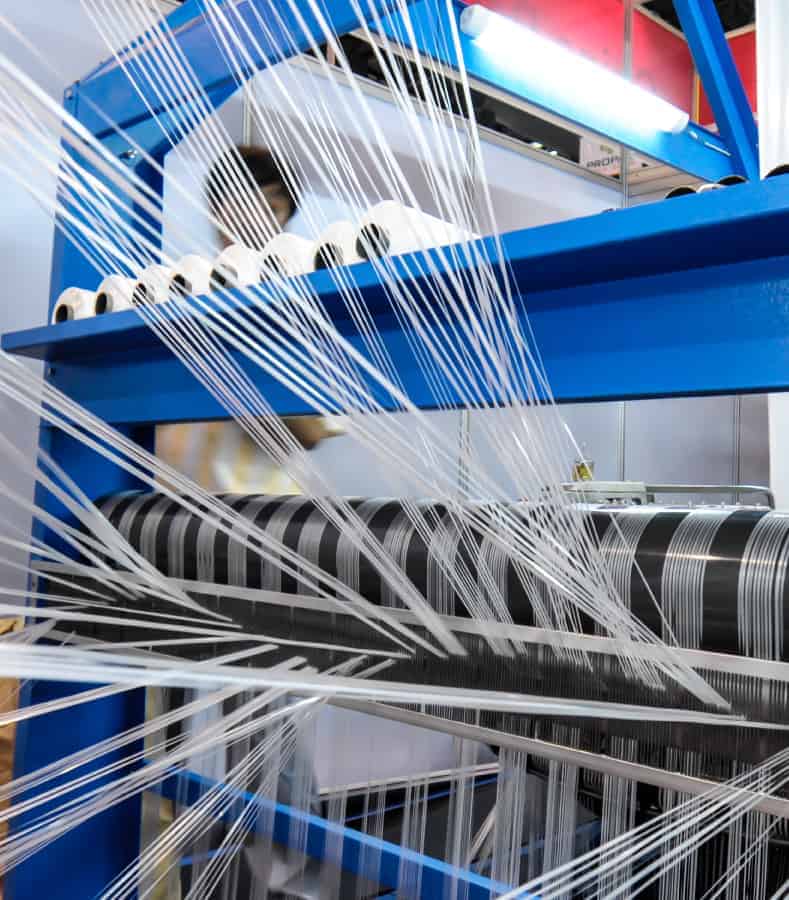 Textile weaving is a straightforward process: Two yarn sets interlace to form woven fabric. However, for industrial weaving to run properly, each part — from warp beam to heddle to cloth roller — must operate precisely. Otherwise, defects and delays can occur.
Textile weaving is a straightforward process: Two yarn sets interlace to form woven fabric. However, for industrial weaving to run properly, each part — from warp beam to heddle to cloth roller — must operate precisely. Otherwise, defects and delays can occur.
Two of the most common sizing chemicals, starch and polyvinyl alcohol (PVOH/PVA), offer very different performance profiles. This article compares both to help manufacturers select the right warp sizing chemical for their textile processes.
Industrial Weaving Process Is Tough on Fibers
The fiber undergoing warp sizing must have important characteristics for textile weaving to run smoothly:
- Tensile strength
- Fiber flexibility
- Abrasion resistance
- Film-forming ability
- Good adhesion
- Strong fiber penetration
- Easy removal
Common Problems in Industrial Weaving
Problems in the industrial weaving process can arise from several issues:
- Inconsistent thickness
- Irregular patterns
- Mechanical defects in the finished product
Some of these result from misaligned or worn-down loom components. However, other issues originate from poorly prepped or mistimed warp yarns and weft yarns. Regardless of the cause, the results are often production delays and quality control challenges.
That’s why textile manufacturers must properly prepare yarns before submitting them for mechanized weaving.
How Warp Sizing Prepares Yarn for Industrial Weaving
For warp sizing to be effective, it must strengthen and protect yarn fibers during high-speed weaving. Industrial looms create rapid, repeated motion that can weaken untreated yarns.
Manufacturers achieve better results through proper preparation, whether they use beam or section warping. The process leads to better results:
- Forms a continuous sheet of warp ends
- Keeps threads straight and parallel
- Improves overall yarn quality
It also allows manufacturers to easily remove the sizing from the fiber after weaving.
Common Textile Warp Sizing Chemicals
Polyvinyl alcohols and starches are both traditional chemical agents in textile warp sizing.
While starch has historically been a popular chemical agent in warp sizing, PVOH inherently has more operational flexibility. That’s why SEKISUI engineers Selvol™ polyvinyl alcohol specifically for the textile industry.
Starch as a Textile Warping Chemical
Starch is a insoluble polysaccharide commercially available as a white, tasteless, odorless powder. Manufacturers often use it as a thickening agent or a chemical stabilizer. This is due to starch’s two comprising polymers, amylose and amylopectin:
- Amylose polymers bond together to form starch’s cyclic structure, resulting in highly ordered crystalline regions.
- Amylopectin is responsible for starch’s strong hydrogen bonding along the molecule, resulting in a rigid structure.
Textile manufacturers often use enzymatic or chemical depolymerization to modify starch and enhance fiber performance. Modifying starch this way increases viscosity but can also affect its stability, adhesion and film-forming performance.
Manufacturers most commonly use starches on organic fibers, both plant- and animal-based.
Plant-based fibers:
- Cotton
- Hemp
- Ramie
- Viscose
- Jute
- Abaca
- Bamboo
- Wheat
- Cane
- Grass
Animal-based fibers:
- Wool
- Silk
- Angora
- Cashmere
- Alpaca
- Mohair
PVOH as a Textile Warping Chemical
Selvol is a white, granular, water-soluble PVOH resin. SEKISUI engineers Selvol PVOH by polymerizing vinyl acetate and hydrolyzing the resultant polymer to produce the alcohol.
A variety of Selvol PVOH grades are available because SEKISUI synthesizes it from polyvinyl acetate. Two major factors determine each grade’s performance properties:
- Molecular weight
- Degree of hydrolysis
Textile manufacturers can use Selvol PVOH on all fiber types and mixtures.
Synthetic fibers:
- Polyester
- Nylon
- Acrylic
Regenerated fibers:
- Rayon
- Viscose
Natural plant-based fibers:
- Cotton
- Hemp
- Ramie
- Jute
- Abaca
- Bamboo
- Wheat
- Cane
- Grass
Animal-based fibers:
- Wool
- Silk
- Angora
- Cashmere
- Alpaca
- Mohair
Selvol PVOH forms a protective film ideal for warp sizing, enhancing durability across both spun and filament yarn types. Additionally, manufacturers can easily remove tough film with hot water during de-sizing.
[Related: 7 Reasons To Use Polyvinyl Alcohol for Textile Warp Sizing]
Selvol PVOH: Key Performance Features in Warp Sizing
SEKISUI’s Selvol PVOH offers key performance advantages as a warp sizing agent. It helps improve yarn durability, flexibility and weaving efficiency across fiber types:
- Superior abrasion resistance
- Greater adhesion to synthetic fibers
- Better warp flexibility for improved elongation
- Increased warp thread strength
- More user-friendly slashing performance
SEKISUI engineers Selvol PVOH and all its products with sustainability in mind, supporting cleaner, more efficient textile applications.
Learn More About Selvol PVOH as a Warp Sizing Chemical
Discover how Selvol PVOH enhances fabric sizing performance across synthetic, natural and blended fibers.
Contact SEKISUI for more information, or request samples today. Reach the SEKISUI Technical Service Team for quick consultation.
Download brochures:
